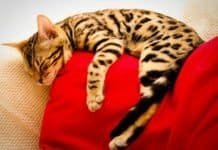Many of the common household hazards are things that we, as people, use and see every day. Beware of some of the simple everyday things currently taken for granted. Yet when introducing a curious new kitten to the household, could spell disaster.
Every household has substances that can pose a hazard to your cat if he’s exposed to them. Here are 8 common household hazards for cats, as well as steps you can take to keep your cat safe.
The 8 common household hazards for Cats:
1. Human Medications
Many common medications are hazardous and may cause serious harm to your cat. Pets often gobble up medications accidentally dropped on the floor, so it’s essential to keep all household supplements and medications tucked away in hard-to-reach cabinets. If you think your cat ingested anything from the medicine cabinet, immediately bring her and the suspect bottle to your veterinarian.
2. Sharp objects
Be sure to keep all sharp objects such as utensils, knives, razors, etc. safely in drawers or holders so they won’t get stepped on or chewed.
3. Stoves & dryers
Watch out for an unattended stove element. Bengals love to be up on the counters and will accidentally stroll across a hot stove without knowing the danger until it’s too late. Remember that kittens and cats are attracted to warm areas. And washers and dryers are notorious temptations for furry warm sleeping bodies!!
4. Toilet lids & rocking chairs
Toilet lids should always be kept down to avoid a kitten falling in and drowning. Watch out for rocking chairs and recliners, which can trap a kitten if you don’t know they are underfoot.
5. Cleaning Products
Household cleaners are poisonous to cats. And antifreeze, in particular, should be kept in a secured cabinet out of harm’s (and kitty’s) way. If your cat does run across the floor or counter as you clean, wipe off his paws.
6. Toxic Plants
Speaking of poison, cats naturally like to supplement their meat-eating diet with greens. And indoor cats will usually go after any houseplants that may be about. Poisonous plants are among common household hazards for cats. Be aware that many houseplants are poisonous to cats! Add supplements to your Bengals’ food to give them the needed nutrients from plants (nutrients that, in the wild, the cat would get from the digestive tracts of their prey). You can also grow catnip and fresh grass indoors for your feline’s vegetarian cravings.
It’s best not to keep real houseplants indoors when you have young kittens. As it is unrealistic not to expect that they may want to chew on the plants themselves which may be poisonous, and/or play in the dirt.
7. Electrical Cords
Electrical cords are highly dangerous to kittens. Yet seem to always attract them for nibbling and teething, which can cause electrocution. When purchasing new appliances such as vacuum cleaners, look for those that have cord retractors, and conceal all wires or encase them in special tubing available from computer and auto supply stores. Even wrapping exposed cords several times with heavy ply plastic tape is better than doing nothing.
8. Open windows
If you live in an upstairs apartment, or your home has more than one story, always be careful of open windows. Even if they have screens, cats and kittens are surprisingly strong and may push the screen out and fall out of the window.
This goes for patios on high rise apartments, etc. A Bengal will leap over the edge to chase a bird or any other object they see flying by.
The list of common household hazards for cats is quite long, so it is not feasible to list clinical signs for each hazard. If you think your cat has ingested something toxic, immediately call the poison control hotline (ASPCA) or bring your cat to a veterinary clinic as soon as possible.







